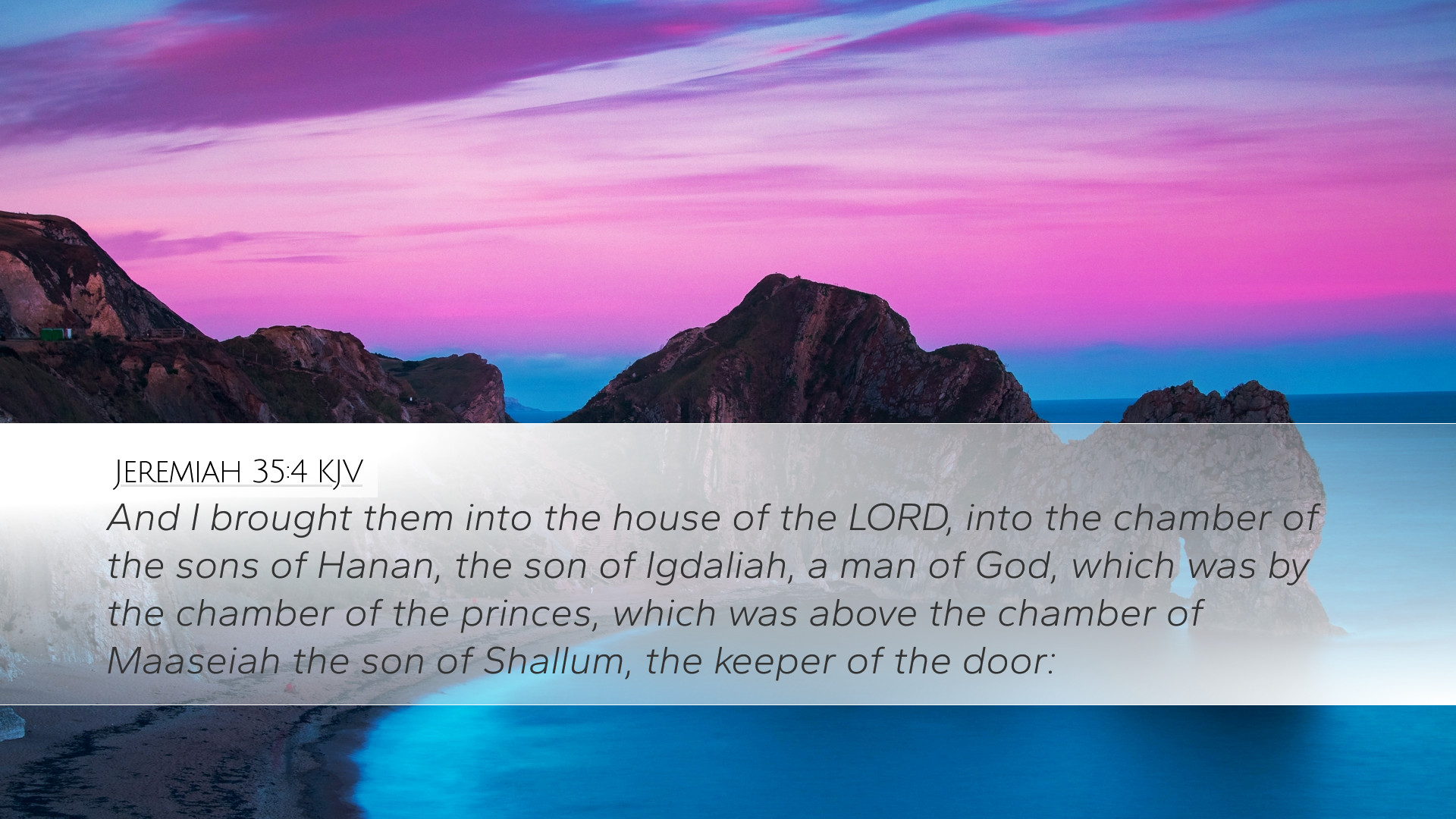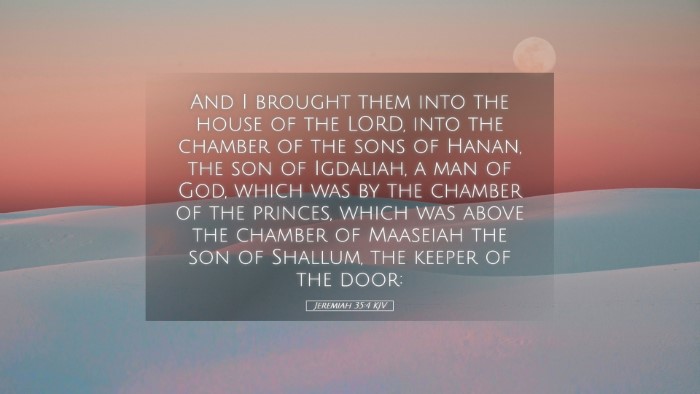Commentary on Jeremiah 35:4
Jeremiah 35:4 introduces us to a significant moment in the narrative of the prophet Jeremiah. The verse reads: “And I brought them into the house of the Lord, into the chamber of the sons of Hananiah, the son of Igdaliah, which was by the chamber of the princes, which was above the chamber of Maaseiah, the son of Shallum, the keeper of the door.” This passage serves as a gateway into understanding the broader themes of obedience, faithfulness, and divine assessment of human choices.
Contextual Background
To appreciate the gravity of this verse, it is essential to understand the historical and social context in which Jeremiah prophesied. The Israelites were at a critical juncture, facing imminent judgment due to their persistent disobedience to God’s commandments. In the midst of this, the Rechabites, a group known for their strict adherence to their ancestral lifestyle, are brought before the prophet as exemplars of faithfulness.
Analysis of Key Themes
- Divine Instructions and Human Response:
The act of bringing the Rechabites into the house of the Lord illustrates Jeremiah’s obedience to divine instruction. It emphasizes how true faith is often tested through actions that reflect loyalty to God.
- Symbolism of the House of the Lord:
The temple represents a place of worship and divine encounter. In bringing the Rechabites here, Jeremiah highlights the contrast between their covenant with God and the faithlessness surrounding them.
- The Importance of Heritage and Tradition:
The Rechabites’ adherence to their ancestors' commands represents a profound commitment to their heritage, contrasting sharply with the rebellious ways of Israel’s populace.
- Judgment and Exhortation:
Jeremiah’s gathering of the Rechabites serves as a powerful exhortation to the people of Judah, prompting them to reflect on their choices and the consequences that await unfaithful stewardship of God’s commands.
Insights from Commentaries
Matthew Henry's Commentary
In his analysis, Matthew Henry emphasizes the contrasting natures of obedience and rebellion. He highlights that the Rechabites’ refusal to drink wine and their commitment to live a nomadic lifestyle mirrors a deeper spiritual truth. Their actions speak volumes about their fidelity to God's directives, making them a living testimony against the waywardness of Israel. Henry notes that God uses their example as a tool for teaching, demonstrating how true commitment to divine principles can stand in stark contrast to apostasy.
Albert Barnes' Notes on the Bible
Albert Barnes provides keen insights into the nature of the Rechabite vow and its implications. He explains that the Rechabites’ abstinence from alcohol signifies a broader symbolism of separation from worldly corruption. Barnes argues that their lineage symbolizes the power of tradition in maintaining spiritual integrity, serving as a reflection for the people of Judah. The invitation to the temple was not merely about physical presence but represented a call to spiritual awakening and realization of God’s expectations for His people.
Adam Clarke's Commentary
Adam Clarke further enriches our understanding by commenting on the notion of spiritual heritage. He posits that the Rechabite practice stems from a divinely ordained mission to maintain purity among God’s people, despite the pervasive moral decay around them. Clarke argues that God's preservation of the Rechabites showcases His faithfulness to those who uphold His teachings, thus urging Jerusalem’s inhabitants to re-evaluate their standing before the Divine. Clarke emphasizes that the narrative serves as a reminder of God's covenantal promises and the need for His people to respond faithfully.
Theological Reflections
Jeremiah 35:4 invites theologians and scholars to delve deeper into the relationship between obedience and divine rights. The act of gathering the Rechabites at the temple sets the stage for a poignant reminder that true faith is characterized not by mere verbal confession but by concrete actions that reflect God’s standards. It challenges contemporary believers to assess how their own lives may parallel the faithfulness exhibited by the Rechabites, calling for a renewed commitment to living out their convictions in both their personal and communal contexts.
Conclusion
The verse serves as an invitation for pastors, students, and scholars alike to reflect on the importance of spiritual fidelity in turbulent times. The juxtaposition of the Rechabites’ unwavering commitment against the backdrop of Judah’s impending judgment should compel us to consider our own responses to God’s call. This narrative highlights not just a historical account but a timeless principle of abiding faith, calling us to stand as witnesses to the faithfulness of God amidst a world increasingly indifferent to His will.


